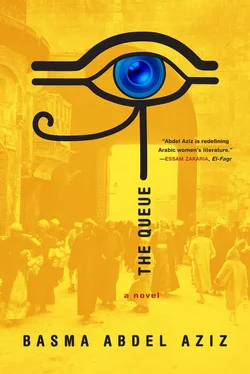Basma Abdel Aziz
The Queue
Patient Information:
Name:
Yehya Gad el-Rab Saeed
Age:
38
Marital Status:
Single
Place of Residence:
District 9 — Building 1
Occupation:
Sales Representative
The first thing Tarek did when he arrived that morning was ask the head nurse for the file. She brought him a transparent plastic folder that appeared to be sealed around the edges, with the words Suspended Pending Approval by the Gate written on the cover. He contemplated this weighty phrase, printed diagonally across a corner in bright red ink. The name Yehya Gad el-Rab Saeed was written on a rectangular white identification card affixed in the very center, and at the bottom of the card was a seven-digit number. The first half was probably part of the patient’s national ID number, and the second half was a code referring to a type of file, something only the filing personnel really understood. Below the number came the name of the attending physician, his own name: Dr. Tarek Fahmy . Hundreds of times he had wished it would be struck from the label, but there was nothing to be done. It would remain there, a thorn in his side, until fate willed otherwise.
He walked into his office with the folder in hand, and Sabah, one of the nurses, followed behind him with a cup of coffee. She placed it on the edge of the antique wooden desk, just as she did every day, and then stood with her hands folded in front of her ample stomach. She began to yawn.
“Something else I can do for you, Dr. Tarek?”
“Stick around today, Sabah, I might need you for something.” His tone was as calm and congenial as it always was, but to her he seemed unusually sullen.
“Of course, Doctor.” She left and closed the door behind her.
Tarek was a serious, middle-aged man, one of the doctors responsible for the hospital’s emergency department. Sabah had known him for years, ever since he was a young trainee who spent nearly all his time with patients and barely ever went home. He didn’t have many friends, didn’t go out after work with his colleagues, and never skipped a shift like the others did. He was rather difficult to read; he kept to himself, shut himself up in his office during breaks, never chatted with the nurses in the hallway, and never mentioned a word about himself or his family. But everyone knew he was skilled at his job and — most important — that he had a good heart.
Tarek took a sip of coffee and began to pace back and forth across the room, his eyes on the folder. He finally settled back in his leather chair, opened one of the edges, and removed the file inside to review it again.
For him, actually handling a patient’s file was a rare occasion. These documents usually contained only basic information, the kind taken from all patients, scribbled down quickly and often haphazardly. When the doctors and nurses tired of filling out forms, they just wrote down the person’s name and age and that was it. But here, someone had thoroughly recorded all the patient’s personal information; no space was left blank. Every question had an answer, even questions a doctor might not be concerned with. Even questions an average person might be surprised to see in a medical file.
Yehya Gad el-Rab Saeed, 38 years old, Single, Place of Residence: District 9 — Building 1, Occupation: Sales Representative … Tarek had gone over these basic details again and again until he knew them by heart, although they were not what interested him most about the patient.
He pushed the first document aside and took out the next one. There was a series of knocks on the door, and he quickly put everything back in the folder, closed it, and hid it in his desk drawer. He sat up straight as Sabah entered again, carrying a new file in her hand.
“There’s a patient asking for you, Doctor. Should I tell him you’re busy?”
He didn’t feel like taking on any other work just now. As soon as he’d begun to review Yehya Gad el-Rab Saeed’s file, he’d been transported to a place where he couldn’t bear to be around other people. But he also didn’t want to have to explain himself to Sabah, so he told her to take the patient to an examination room and wait for him there. He was considering whether he should return the folder to the filing room instead of leaving it there in his office when he remembered the keys sitting on his desk. He slipped on his white coat and left the room, softly closing the door behind him and making sure to turn the key twice in the lock before carefully placing it in his shirt pocket.
The examination only took a few minutes. He asked the patient a few quick questions, hastily examined him, and scribbled down a diagnosis and treatment, but his mind wandered back to the folder he’d left in his desk. He considered making a copy of the file and taking it home, where he could read and reflect upon it without interruption, but he pushed the idea aside, afraid of the consequences. He was beginning to understand that this was no longer a trivial matter; it was of interest outside the hospital administration’s jurisdiction as well.
Tarek was a man who didn’t overstep boundaries, a man who’d never been to the Gate, not once in his life. No questions, no problems — life passed him by both predictably and monotonously, just as he liked it. He’d finished his studies and received his master’s degree, and it wouldn’t be long now before he could open his own clinic. He’d even asked a colleague out on a date not long ago. The only thing hindering this stable, traditional plan of his was Yehya Gad el-Rab Saeed.
Why had he stayed in the hospital that day, when he always left right after finishing his shift? Why had he insisted on checking on the injured, resolutely doing all he could to treat their wounds and stitch them up before the ambulance took them away to the military hospital? Why had he been drawn to Yehya in particular, rushing to perform an X-ray and ignoring everyone else? His head was all muddled; the answers and details steadily slipped away. There were parts of that day that he did remember, and he had reviewed them over the course of the intervening weeks, but these were rapidly outnumbered by parts he couldn’t recall. It was as if entire pieces of what had happened were simply gone. Looking back through the file should have helped, but instead it only exacerbated his sense of confusion.
On his way back to his office, he walked past the empty examination rooms and saw several new doctors drinking tea and coffee by the radio. He paused a minute to listen: it was the Youth Station presenter speaking on the air with a call-in guest. The presenter asked the guest about her children, who were still in school, and applauded their nationalist values, which were so worthy of emulation. How honorable they were not to leave the house when the Disgraceful Events broke out! What laudable principles they had, which had kept them from being swept up in lies or spreading false rumors themselves.
The guest was delighted by the praise lavished upon her — she spared no effort on her children, she added excitedly. She offered them constant guidance, so they would grow up knowing what was good for them, and she’d never feared they would stray from what was proper. Bewildered, Tarek shook his head. He made his way back toward the head nurse. He asked her if she would let him finish some important paperwork in his office without interruption, and she told him she would divide his patients among his colleagues. She summoned Sabah, who had finished her breakfast, and told her to distribute the files equally among the other rooms.
Читать дальше











